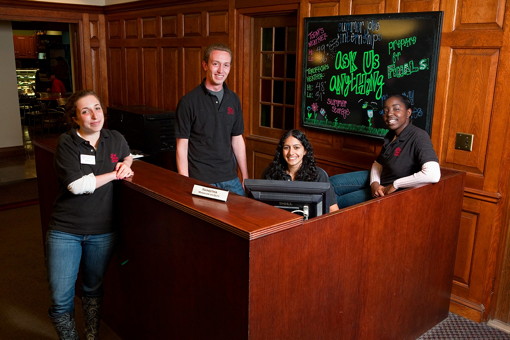CAMPUS LIFE
Tatkon Center: Hub of support for first-year students

About 20 student staff members work at the Carol Tatkon Center each semester. At the front desk, first-year students can rent a laptop, learn about a program or ask about anything on their minds.
There was no Carol Tatkon Center in 1959.
"Our only practical alternative was to just deal with it," recalls Dick Lynham '63 of being a freshman at Cornell before there was a comprehensive program and center to provide guidance to first-year students.
"When we made our 45th Reunion class gift of $150,000 to the Carol Tatkon Center four years ago, our hope was that our gift could enable the center to provide additional resources for first-year students," Lynham said. "This resonated strongly with our classmates because in our day, such resources were scarce."
A first-year student's to-do list can be summed up in one all-encompassing task: Take advantage of everything Cornell has to offer and take it in stride. Students' introduction to the Cornell community begins during orientation and continues throughout the year at the Carol Tatkon Center, which serves as an umbrella for the hundreds of events, programs and resources available for first-year Cornell students.
Orientation starts at the end of August when new students first arrive on campus. Dozens of groups and offices come together during a coordinated week of events on campus to familiarize students with their college and its faculty, address important topics like health and well-being and gorge safety, introduce them to academics, university resources and services, and let them know where they can go if they need help.
Other orientation events are less formal and bring students together in a fun way so they can get to know each other. Andrew Ebanks '13 is on the Orientation Steering Committee, the student group that helps organize orientation and sponsors events like Silent Disco, Trivia Night and Big Red Blowout.
"Everyone begins feeling like they are part of the community," Ebanks says, "even though they have only been on campus a short time. Cornell starts to feel like home, and that's a good thing because they will be living here and calling it home for the next few years."
Once orientation is over, freshmen and transfer students can still benefit from advice and insight about getting the most out of Cornell. Located on North Campus, the Carol Tatkon Center, which the university refers to as "Cornell's intellectual, support and resource center for first-year students," is the hub of such support. At the center, students can informally interact with faculty members, get tips from upper-level students, learn about research and courses of study, attend faculty workshops and presentations, get help with writing, and find answers to casual questions and serious concerns.
"What we're doing is creating a shared first-year experience. We introduce students to the university and help them transition by supporting and inspiring them throughout the year," says Carol Grumbach '78, J.D. '87, the Jack and Rilla Neafsey Director of the Carol Tatkon Center and associate dean for New Student Programs. "We want them to be a part of the academic and social community, find their passion and explore."
Ebanks, a student manager at the Tatkon Center, embraces the student staff's motto – "Ask us anything" – and recalls how the center helped him during his first year at Cornell.
"Events like coffeehouses, where students can meet faculty and learn about different areas of study and research opportunities, made me feel connected to something from the beginning. It's that sense of community that helps you out and gives you direction," he says.
When Dick Lynham was a freshman, Carol Tatkon '59, whose bequest made the center possible, was a senior, president of Balch Hall and managing editor of The Cornellian. After graduation, she went on to a successful career as an economist in the oil industry, and she served on the Cornell Board of Trustees, including as vice chair, in the 1990s.
Center seeks full funding
The Division of Student and Academic Services, which has a campaign target of $15 million, hopes to raise $3 million to fully fund the Carol Tatkon Center's endowment. All funds raised will support first-year student programs and services at the center. The Tatkon Center also falls under the university's campaign priority for funding educational excellence.
Carol Tatkon Center naming opportunities include: Office and classroom, $25,000; entrance lounge, $150,000; and café/lounge, $200,000. Endowments include a student worker fund, $100,000, and a director's discretionary fund, $100,000.